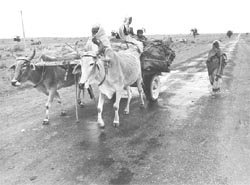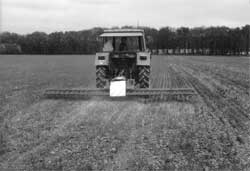During 2006-07, a record disbursement of agricultural credit took place. Against credit allocation of Rs 160 billion, an amount of Rs 168.8 billion was disbursed, which reflects 22.8 percent increase as compared to last year's disbursement. This was disclosed in an Annual Performance Report (2006-07) of Ministry of Food, Agriculture and Livestock (Minfal), which was released recently. According to the report, the Public Sector Development Project (PSDP) of Minfal for the year 2006-07 included 61 projects. Out of which 41 were ongoing and 20 new projects to support policy objectives set at the national level. The original PSDP allocation was Rs 11,800 million. The allocation was revised to Rs 13,600 million after mid year PSDP review. However, from the enhanced revised allocation, Rs 329.5 million was not released to Minfal. Moreover, Rs 852.4 million savings indicated by Minfal for re-appropriation for its mega project, 'National Programme for Improvement of Watercourses' was diverted to other Ministry. As such, the Minfal's allocation was reduced to Rs 12,418.1 million. Out of this amount, Rs 1,741.9 million approved for re-appropriation for different projects by the P&D Division was also not released which were finally surrendered. Thus Rs 10,676.2 million was released to Minfal's project upto June, 2007 and against it, the utilisation was of Rs 10,244.37 million which is 96 percent of the amount released. Minfal report mentioned that the other key achievements of the government, during the year 2006-07, have been signing of agriculture specific MoUs/Agreements/Protocols with friendly countries and of MFN status for agricultural exports with various other countries. A number of Joint Ministerial Commissions (JMC) were set-up relating to agricultural development, and policy-level negotiations were undertaken under the WTO regime as well as Safta. Minfal report revealed that government recognises the role of agricultural growth in boosting overall growth of the economy and reducing poverty. For achieving higher growth in agriculture, priority objectives set by Minfal include enhanced productivity to ensure food security, efficient import substitution and export orientation. Within these broad objectives, the main element is to accelerate growth by narrowing existing yield gaps, promotion of agriculture related business enterprises, provision of quality support services to farmers, and market reforms to increase profitability of agriculture for small farmers. Moreover, attention is being focused on increasing the production of major crops like wheat, cotton, sugarcane, rice and maize through remunerative market-based prices, evolving new high-yielding varieties requiring low inputs through adaptive research, help improving market and storage facilities with public-private nexus, and providing greater access to farmers for optimal technologies and seasonal credit. Such far-reaching objectives require efficient agriculture institutions to effectively respond to growing and diversifying needs of farmers to accelerate productivity and growth at the grassroots. Minfal has initiated several reforms of the agriculture sector institutions to promote decentralisation and liberalisation of agriculture services. For reforming the research system, Pakistan Agricultural Research Council (Parc) is being restructured with more autonomy to the Board of Governors both in formulation of research policy and financial empowerment. Similarly, in agriculture extension, reforms are being conceived to improve research and extension linkages in the backdrop of further decentralising extension services at the union council level. To face the future challenges of policy analysis, APCom's mandate has been redefined to play a meaningful role in the Ministry, priority focusing on agriculture policy issues, monitoring and analysis of international trade agreements for suggesting measures to improve Pakistan agriculture's competitiveness in the global market. To support agribusiness development in the livestock sector, the Prime Minister, in principle, has approved a National Livestock Development Policy. A new market-friendly wheat policy is in place, key elements of which include free wheat marketing, voluntarily selling by farmers at the guaranteed minimum price, and maintaining a clear distinction between operational reserve and strategic reserve by the government. A comprehensive fisheries policy has been prepared and presented to the Prime Minister. In addition to above mentioned policy reforms, Minfal has also undertaken a project for the strengthening of capacity for improvement of agricultural statistics in Pakistan. The objectives of the project are to strengthen the capacity of Provincial Crop Reporting Service (CRS) by providing them motorcycles, vehicles, computers, office equipment, technical equipment and O&M cost for field operations. It will help the CRS in provision of timely agricultural statistics for policy formulation and early warning system. Efforts are underway to augment development component of agriculture through continued supply of financial resources for agriculture sector development to support policy objectives set at the national level. The agriculture sector performed well as compared to the previous year and growth in the agriculture sector bounced back from 1.6 percent in 2005-06 to 5.0 percent in the 2006-07. The major crops registered an impressive growth of 7.6 percent. The minor crops grew by 1.1 percent slightly up from the last year's growth of 0.4 percent. The livestock sector grew by 4.3 percent during 2006-07 as against 7.5 percent in 2005-06. The wheat production of 23.295 million tons during 2006-07 is highest ever in the country's history, registering an increase of 9.5 percent over 2005-06. Sugarcane production improved by 22.6 percent over 2005-06 to 54.7 million tons. Cotton production at 13 million bales remained almost unchanged in comparison to 13.02 million bales in 2005-06. Rice production at 5.4 million tons was marginally lower than 5.5 million tons produced in 2005-06. The major factors responsible for increased agricultural production are, agricultural credit availability, support/intervention prices, government policy of encouraging use of the balanced fertiliser by granting subsidy on phosphatic and potashic fertilisers, increased irrigation water availability and favourable weather conditions particularly during Rabi season. Within crop sector, import substitution and crop diversification are two important development priorities of Minfal. Efforts are being made to maximise oilseed production, such as sunflower and canola etc to substitute imports of edible oil to save foreign exchange. Like-wise under crop diversification programme, government has planned to introduce high value crops to diversify production and to enhance net farm income. The milk and meat production touched the level of 33.2 and 2.6 million tons respectively in 2006-07. It implies 6.2 and 6.6 percent higher production. Fish production was 0.6 million tons ie 3.6 percent higher than in 2005-06. Growth in the targets for milk and meat production and livestock productivity are aligned with Medium Term Development Frame Work (MTDF), which aims to grow by to 6-8 percent annually. Government has provided Rs 100 million for launching 'Grow More Wheat Campaign 2006-2007'. Under the campaign wheat production technologies are being disseminated to the farming community through agriculture extension services in the provinces. Copyright Business Recorder, 2008









